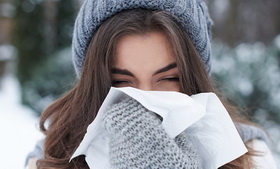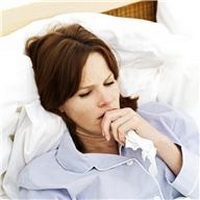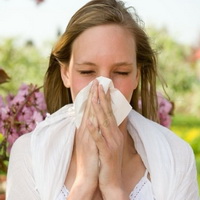Postpartum cold-induced syndrome and related syndromes:an introduction of postpartum cold-induced syndrome, cough, cough and belch.
-
 ✵Gynecology of TCM is a branch to study the physiological and pathological characteristics of women and to prevent and treat syndromes specific to women. Gynecology of TCM research scope including irregular menstruation, amenia, metrorrhagia, infertility, postpartum syndromes, breast syndromes, and miscellaneous syndromes, etc.
✵Gynecology of TCM is a branch to study the physiological and pathological characteristics of women and to prevent and treat syndromes specific to women. Gynecology of TCM research scope including irregular menstruation, amenia, metrorrhagia, infertility, postpartum syndromes, breast syndromes, and miscellaneous syndromes, etc.
- Postpartum cold-induced syndrome and related syndromes.
-
✵The postpartum cold-induced syndrome is also known as the cold-induced syndrome of women after childbirth, a series of cold-induced syndromes of women following childbirth. The related syndromes are other syndromes due to related or similar pathogenic reasons.
✧ In the TCM system, the pathogenic reasons for the postpartum cold-induced syndrome normally are blood deficiency and Yin deficiency, residue blood, loss of blood and Yin deficiency fever, loss of body fluid, affected by wind, cold, and seasonal pathogens, etc. Common related symptoms observed are different. The related syndromes are understood due to similar reasons and specific reasons, with different and specific symptoms observed.
✵The women cold-induced syndrome after childbirth and related syndromes are introduced: postpartum cold-induced syndrome, postpartum cough, postpartum cough and reverse flow of Qi, postpartum cough and belch, etc.
- Postpartum cold-induced syndrome.
-

✵The postpartum cold-induced syndrome is a cold-induced syndrome following childbirth due to various pathogenic reasons. It is also known as cold-induced syndrome after childbirth.
✧ In the TCM system, the pathogenic reasons for the postpartum cold-induced syndrome normally are blood deficiency and Yin deficiency, residue blood, loss of blood and Yin deficiency fever, loss of body fluid, affected by wind, cold, and seasonal pathogens, etc.
✵Ancient herbalists who hold a syndrome differentiation viewpoint with similar explain of pathogenic reasons, and the relevant representative work are introduced and quoted:"A woman gave birth in midwinter months, or was affected by exogenous wind and cold, or got hurt internally from raw and cold food drink, as a result, lochia could not be discharged, distension and pain in the heart and abdomen, fever and aversion to cold(fear cold), no perspiration...; Or she gave birth in midsummer months and was affected by exogenous wind and cold, got hurt internally from raw and cold food drink, lochia could not be discharged, cephalea and fever(headache, fever), vexation and spontaneous perspiration(irritable, fidget, spontaneous sweating), dry pharynx and thirst..., or residue blood is not discharged, distension and pain in the abdomen and bellybutton, ..." [05].
"A woman suffers from exogenous affection and fever...affected by the cold pathogen during childbirth and easily affected. If observe symptoms include cephalea(headache) and body pain, aversion to cold and high fever, or contracture of waist and back, the pulse is tight and rapid, it is the syndrome of exogenous affection. But this type of exogenous affection is different from cold-induced syndrome..." [06].Different type are introduced:
⑴.A woman suffers from exogenous cold affection and fever after childbirth, not very deficient;
⑵...., Qi deficiency and weakness of the spleen viscus; ⑶...., Yin deficiency of the liver, spleen, and kidney; ⑷...., a cold deficiency is serious; ⑸...., physically strong and Qi is excessive; ⑹...., fire is excessive and not relieved; ⑺...., got affected with both cold and wind, stagnancy in both exterior and interior;"Cold-induced syndrome after childbirth: in the condition Qi and blood are both deficient, the Ying and Wei system lost proper function, a disorder in life habits include sleep and wakeup, improper regulation and supplement, get hurt from wind and affect the Wei system, get hurt from cold and affect the Ying system, as a result, cold-induced syndrome..." [07].Different types are introduced:
⑴.A woman suffers from cold-induced syndrome after childbirth, sweating, is the syndrome of wind-affection;
⑵...., no sweating, is the syndrome of cold-affection; ⑶...., alternative chills and fever; ⑷...., cephalea(headache, or pain in head); ⑸...., generalized pain(pain of the whole body); ⑹...., fever but not aversion to cold; ⑺.... fever and thirst;
✵The postpartum cold-induced syndrome other common types are known including:
Postpartum cold-induced syndrome, loss of excessive volume of blood after childbirth, lack of body fluid, deficiency in both Yin and Yang, get affected by wind, cold, seasonal pathogens.
Postpartum cold-induced syndrome, deficiency in blood and Qi after childbirth, early wakeup and work in days not rest enough, get hurt by cold, gradually aversion to cold, fever, pain in the head, neck, shoulder, and joints.
Postpartum cold-induced syndrome, loss excessive volume of blood and much sweating(over perspiration), depression and vexed. Pulse is weak and slight, no appetite(no food intake), hard stool, on the contrary, sweating on head. For the reasons, blood deficiency and Jue(cold limbs), Jue and surely will depression, in cases of depression will surely great sweating, for blood deficiency and Jue, sole Yang going upward, thus sweating on the head. So women no perspiration after childbirth, loss blood and Yin, Yang turns excess solely, once sweating on the head, Yin and Yang are harmonized. For the reasons hard stool, vomit, and no appetite.
Postpartum cold-induced syndrome, loss excessive volume of blood after childbirth, short of breath, headache and vexation, pain in bone and joints, vexation in the heart and chest, similar as vacuity vexation.
Postpartum cold-induced syndrome, affected by wind after childbirth, dysphoria with smothery sensation(heat vexation) in limbs, headache; or only heat vexation, no headache.
Postpartum cold-induced syndrome, deficiency and emaciation after childbirth, cold and fever, poor appetite(low food intake), distention in abdomen, etc.
Postpartum cold-induced syndrome, affected by wind after childbirth, fever, and red face, panting and headache.
Postpartum cold-induced syndrome, affected by wind after childbirth, not relieved in tens of days, slight headache(mild headache or mild cephalea), aversion to cold, fever now and then, hard below the heart, dry retching, sweating. Other symptoms that might be observed are spontaneous sweating, or thirst, or diarrhea, or palpitation under the heart, consumption, and abdominal urgency.
Postpartum cold-induced syndrome, lochia after childbirth, suddenly stopped, clear-minded in the day time, wild talk at night, the alternation between fever and cold, as seeing ghosts. This is the case of the heat entering the blood chamber, if not treated, might develop to other syndromes.
Postpartum cold-induced syndrome, deficient heat, and headache, fever of the body, contracture, and spasm pain in the abdomen.
Postpartum cold-induced syndrome, alternation vacuity heat after childbirth, vexation and fullness in heart and chest, pain in bones joints, high fever and headache, turn worse in the late afternoon, symptoms are similar to malaria.
- Postpartum cough.
-

✵The postpartum cough is a cough syndrome occurring following childbirth, due to various pathogenic reasons. It is also known as cough after childbirth.
✧ In the TCM system, the pathogenic reasons for the postpartum cough normally are blood deficiency, lung meridian is affected by exogenous pathogens and turns to cough, or was affected by wind, heat, cold, dampness, or eat hot food, or febrile disease, or Qi blocks, symptoms observed are cough, pain in heart, short of breath and cough, cold and fever in limbs, depression in the heart and dry mouth, vexation and irritable, palpitate with fear in dream, Qi deficiency, lacking strength in limbs.
✧Ancient herbalists who hold a syndrome differentiation viewpoint with similar explain of pathogenic reasons, and the relevant representative work are introduced and quoted:"Cough after childbirth, or due to exhaustion and hurt of Yin and blood, or due to lung Qi is deficient and get hurt, or due to Yin fire going upward, or is affected by wind and cold..., but all due to insufficiency of the stomach Qi..." [02].
"A woman suffers from cephalea(headache), fever, rhinobyon(stuffy nose, nasal obstruction), cough, what is it? It is mainly due to the hurt from pathogenic Qi in nature.
A woman suffers from cough after sunset, what is it? It is mainly due to Yin-fire, in the condition cough before mid-night it is mainly due to stomach fire, in the condition cough after mid-night it is mainly due to Yin deficiency.
A woman suffers from a cough at dawn or in the morning, what is it? It is mainly due to Yang-fire.
A woman suffers from cough whole yearly, what is it? It is due to deficiency and cold of lung and stomach.
A woman suffers from cough in spring, what is it? It is due to the rise of the fire and affection from wind and cold.
A woman suffers from cough in summer, what is it? It is due to the rise of Yin-fire and restriction of the lung.
A woman suffers from cough in autumn, what is it? It is due to dampness that hurt the lung.
A woman suffers from cough in winter, what is it? It is mainly due to exogenous wind and cold pathogen affection." [03]."Cough:...as Danxi said: wood Qi rising in the spring, fire Qi flaming up in the summer, dampness and heat hurt the lung in the autumn, wind and cold comes externally in the winter..." [04]. Different types of cough are introduced:
⑴.Cough in different time of a day: Cough more in the morning or before the noon, is mainly related to stomach fire, is the excess heat type; Cough in the afternoon, is mainly related to Yin deficiency or Yin blood deficiency; Cough at sunset, is due to fire floating to the lung; Cough at dawn time, is due to the fire of food flow to the lung;
⑵.Cough with distention in the lung, at left or at right and could not sleep, is the condition of phlegm with blood stasis and Qi stagnancy;
⑶.Cough due to excessive heart fire;
⑷.Cough due to kidney deficiency and deficiency fire flowing upward;"A woman suffers from Qi deficiency after childbirth, deficiency of the Wei system, the skin and hair are not in a good state, interspaces of skin and muscles being loose, attacked by wind and cold, invading the lung first, also develop to cough. Its symptoms are fever, aversion to cold, nasal obstruction(stuffy nose), heavy voice, or many sneezes, clear nasal discharge, etc." [07].Different types are introduced:
⑴.A woman suffers from Qi deficiency after childbirth, was affected by wind and cold, cough, symptoms are fever, aversion to cold, nasal obstruction, heavy voice, many sneezes, clear nasal discharge, sweating.
⑵.A woman suffers from Qi deficiency after childbirth, was affected by wind and cold, cough, symptoms are fever, aversion to cold, nasal obstruction, heavy voice, many sneezes, clear nasal discharge, chronic cough and not relieved, sticky nasal discharge and saliva phlegm."A woman suffers from cough due to stomach Qi deficiency: the stomach Qi is deficient after childbirth, the five Zang-viscera lost support, easily get affected by exogenous pathogens." [07].Different types are introduced:
⑴.A woman suffers from stomach Qi deficiency after childbirth, affected by exogenous pathogens, Yin fire flow upward, and cough;
⑵.A woman suffers from stomach Qi deficiency after childbirth, Yin deficiency and affected by exogenous pathogens, and cough;
⑶.A woman suffers from stomach Qi deficiency after childbirth, Yin deficiency and affected by exogenous pathogens, dry cough with internal heat;"Cough after childbirth: A woman suffers from cough after childbirth, ⑴.due to the exogenous wind and cold affection, ...⑵.due to fire from Yin deficiency, ...⑶.due to affection from blood stasis flow upward..." [08].
✧The postpartum cough, other pathogenic reasons also could be phlegm accumulation and retained fluid.
✧Ancient herbalists who hold a syndrome differentiation viewpoint with similar explain of pathogenic reasons, and the relevant representative work are introduced and quoted:"Cough of wind-phlegm retained fluid: a woman suffers from deficiency and weakness of the spleen and stomach, affection from exogenous wind pathogen, lead to phlegm stagnancy and cough, amblyopia, and dazzled." [04]. Different types of cough are introduced:
⑴.Cough of phlegm due to wind-heat;
⑵.Cough of phlegm due to coldness;
⑶.Cough of phlegm due to summer heat;
⑷.Cough of phlegm due to Qi depression;
⑸.Cough of phlegm due to liver fire from anger;
⑹.Cough of phlegm due to liver wind heat;
⑺.Cough of phlegm due to liver and kidney Qi deficiency;
⑻.Cough of phlegm due to stagnancy binding of the spleen;
⑼.Cough of phlegm due to liver spleen is hurt from anger;
⑽.Cough of phlegm due to spleen deficiency and phlegm counterflow;
⑾.Cough of phlegm due to deficiency and weak of spleen Qi;
⑿.Cough of phlegm due to stagnancy of lung Qi;
⒀.Cough of phlegm due to Yin deficiency and water lost regulation;
⒁.Cough of phlegm due to kidney deficiency and Yin fire;
⒂.Cough of phlegm due to kidney deficiency and fire could not return to the origin."Cough after childbirth, there are cases due to residue lochia flow upward, the lung was affected, ...there are cases due to wind affection, aversion to cold and fever, ...there are cases due to Yin deficiency fire excess, Yin fire burning upward and hurt the lung..." [06].
✵The postpartum cough other common types are known including:
A woman suffers from postpartum cough, lochia counter flow upward after childbirth, enter into the lung system, cough.
A woman suffers from postpartum cough, affected by wind and cold after childbirth, cough with much phlegm, sticky phlegm.
A woman suffers from postpartum cough, cough with much phlegm after childbirth, sticky phlegm and panting.
A woman suffers from postpartum cough, cough and panting, after childbirth.
A woman suffers from postpartum cough, due to wind and cold affection. "Case a woman cough with heavy sound after childbirth, stuffy nose(nasal stuffiness, nasal obstruction), shed tears, is the condition of cough after childbirth due to wind and cold." [02].
A woman suffers from postpartum cough, due to blood deficiency of the liver and spleen. "Case after childbirth, a woman spit phlegm in the morning, fever after sunset, insomnia or could not sleep at night, ever used recipes to clear phlegm and eliminating fire, gradually emaciated and thin, appetite is reduced day by day, the condition turns severe. Spit phlegm in the morning is due to spleen Qi deficiency; fever at night is due to deficiency of liver blood; could not sleep in the day and at night, exhaustion of spleen blood." [02].
A woman suffers from postpartum cough, due to Yin fire going upward and deficiency of spleen and kidney. "Case after childbirth, a woman cough with excessive phlegm, red face and dryness in mouth(dry mouth), internal heat and fever after late afternoon, affect irregularly. This is the condition due to Yin fire going upward and deficiency of spleen and kidney." [02].
A woman suffers from postpartum cough, due to stomach sick and lung. "Case after childbirth, a woman suffers from fullness in abdomen and no appetite, tears and spit phlegm, edema on the face and reversed flow of Qi(cough), this is the condition sick in the stomach and lung." [02].
- Postpartum cough and reverse flow of Qi.
-

✵The postpartum cough and reverse flow of Qi is a syndrome cough and reverse flow of Qi occurring following childbirth, usually due to various pathogenic reasons include stomach deficiency and Qi coldness, etc. Its difference from postpartum cough is not only cough but also with the reverse flow of Qi. It is also known as Ke Ni(cough, and reverse flow of Qi), or cough and reverse flow of Qi after childbirth.
✧Ancient herbalists who hold a syndrome differentiation viewpoint with similar explain of pathogenic reasons, and the relevant representative work are introduced and quoted:"Cough after childbirth: Ke Ni(cough and reverse flow of Qi)...there is a case due to stomach Qi deficiency and cold, or due to middle Qi insufficiency, the fire of the Chong and Ren channels flow upward, or due to drinking much water, water is retained and Qi reverse flow, or due to stoppage of defecation and urination, blocking the lower energizer, reverse flow of Qi, or due to stomach collapse. In general, cough and reverse flow of Qi after childbirth is a syndrome of stomach deficiency and coldness..." [07].Different types are introduced:
⑴.A woman suffers from cough and reverse flow of Qi after childbirth, due to stomach Qi deficiency and coldness...or with fever.
⑵.A woman suffers from cough and reverse-flow of Qi after childbirth, extreme deficiency and serious emaciated, reduced appetite, cough and reverse flow of Qi, is the syndrome of stomach collapse, difficult or incurable.
⑶.A woman suffers from Qi and blood both deficiency, was affected by wind and cold pathogens by chance, reverse flow upward of Qi, is an extreme syndrome of stomach Qi deficiency cold, a severe case...difficult or incurable.
- Postpartum cough and belch.
-

✵The postpartum cough and belch is a syndrome cough and belch occurring following childbirth, usually due to various pathogenic reasons. It is also known as cough and belch after childbirth.
✧ In the TCM system, the pathogenic reasons for the postpartum cough and belch normally are hurt of Qi and loss of blood, injury of the Zang and Fu-viscera, cold and wind combat with Qi, Qi counter flow upward, spleen deficiency and cold accumulation, coldness hide in the stomach, for eat hot food and cough belch. Qi deficiency in both Yin and Yang, the Ying Qi and Wei Qi all counter flow reverse and cold limbs, lead to this syndrome.
✵The postpartum cough and belch common types are known including:
⑴.A woman suffers from postpartum cough and belch, vexation(upset, perturbed), incessant cough, and belch.
⑵.A woman suffers from postpartum cough and belch, vomit and throws up, palpitation and blurred vision, no appetite.
⑶.A woman suffers from postpartum cough and belch, incessant throw up in days after childbirth, suffering, and willing to die.
References:
-
- 01.Postpartum cold-induced syndrome and related syndromes:an introduction of postpartum cold-induced syndrome, cough, cough and belch.
- 02.Nǚ Ke Cuo Yao(the Synopsis of Gynaecology).By 薛己(Xuē Jǐ)[Ming].
- 03.Fù Kē Bǎi Biàn(the Differentiations in Hundred Syndromes of Gynaecology).By 庄履严(Zhuāng Lǚyán)[Ming].
- 04.Nǚ Ke Bǎi Xiào Quán Shū(the Efficacious Complete Book of Gynaecology).By 龚居中(Gōng Jūzhōng)[Ming,1630].
- 05.Huang Shi Nǚ Ke(the Synopsis of Huang's Gynaecology).By 黄彦荣(Huáng Yànróng)[Ming,1504].
- 06.Ye Shi Nǚ Ke Zhèng Zhì(the Syndromes and Therapeutics of Ye's Gynaecology).By 叶桂(Yè Guì)[1817].
- 07.Fù Kē Bèi Kǎo(the References of Gynaecology).By 何应豫(Hé Yīngyù)[1820].
- 08.Fù Kē Liáng Fāng(the Effective Prescription of Gynecology).By 何梦瑶(Hé Mèngyáo)[1751].
